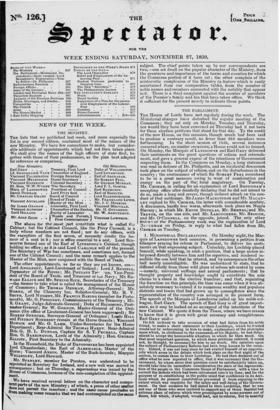NEWS OF THE WEEK.
THE MINISTRY.
THE lists that we published last week, and more especially the list in our second edition, contained most of the names of the new Ministry. We have few corrections to make, but consider- able additions of appointments which had not then taken place. We shall give the names of the high officers of state first, to- gether with those of their predecessors, as the plan best adapted for reference or comparison.
New Ministers. Office. Old Ministers.
Earl GREY . . . . Treasury, First Lord . Duke of WELLINGTON. Ld. BROUGHAM& VAUX Chancellor of England . Lord LYNDHURST. Viscount PALMERSTON Foreign Secretary . . Earl of ABER.OEEN. Viscount MELBOURNE Home Secretary . . . Sir ROBERT PEEL. Viscount GODERICH . Colonial Secretary . . Sir GEORGE MURRAY. Rt. Hon. W.W.WYNNE War Secretary . . . Lord F. L. GowErt. Mani. of LANSDOWNE President of Council . Earl BATHURST. Baron DURHAM . . Lord Privy Seal . . . Earl of ROSSLYN.
Mr. CHARLES GRANT Board of Control . Lord ELLENBOROUGII.
ity3foaasrtde roorfr zdeeNi nt. Mr. FRANKLAND LEWIS.
ViSCOUllt AUCKLAND Mr. J. C. HERRIES.
Sir JAMES GRAHAM . Admiralty, First Lord . Viscount MELVILLE. ViSCOUrit ALTHORP . Chancellor of the Excheq. Mr. H. GOULBURN. Lord HOLLAND . . Duchy of Lancaster . Mr. W. ARBUTHNOT.
Mr. AGAR Faxis . {Woods and Forests,'
Viscount LOWTHER. First Commissioner
The above for theAnost part constitute what is called the Cabinet; .but the Cabinet Council, like the Privy Council, is a body whose numbers are not fixed ; nor do any offices, with the exception of the first seven, of necessity confer the ho- nour of' a seat in it ; nor is office essential to a seat. Lord SID- MOUTH formed one of the Earl of LIVERPOOL'S Cabinet, though holding no office ; as it is said Lord CARLISLE will of the present. The Secretary of War has sometimes, and sometimes not, formed one of the Cabinet Council ; and the same remark applies to the Master of the Mint, now conjoined with the Board of Trade.
The other appointments, as far as they are yet known, are— Lord ANGLESEY, Lord-Lieutenant of Ireland ; Lord J. RUSSELL, Paymaster of the Forces ; Mr. POULETT Tgr -ON, Vice-Presi- dent of the Board of Trade, and Treasurer of tile Navy ; Mr. ED- WARD ELLICE and Mr. SPRING RICE, Secretaries of the Treasury —the former to take what is called the management of the House of Commons ; Sir THOMAS DENMAN, Attorney-General ; Mr. HORNS, of the Chancery bar, Solicitor-General ; Mr. R. V. SMITH, Lord NUGENT, Mr. FRANCIS BARING (member for Ports- mouth), Mr. G. PONSONBY, Commissioners of the Treasury ; Mr. R. GRANT, Judge-Advocate-General; Duke of RICHMOND, Post- master-General ; Sir W. GORDON, Master-General of the Ord- nance (the office of Lieutenant-General has been suppressed) • Sir ROBERT SPENCER, Surveyor-General of Ordnance ; Lords HILL and FITZROY SOMERSET remain at the Horse Guards ' • Viscount HOWICK and Mr. G. LAMB, Under-Secretaries for the Home Department ; Rear-Admiral Sir THOMAS HARDY, Rear-Admiral Hon. G. H. L. DUNDAS, Captain Sir S. T. PECHELL, Captain Hon. G. BARRINGTON, Lords of the Admiralty ; Hon. GEORGE ELLIOTT, First Secretary to the Admiralty. In the Household, the Duke of DEVONSHIRE has been appointed Lord Chamberlain; the Earl of ALBEMARLE, Master of the Horse; Viscount AlVSON, Master of the Buck-hounds; Marquis WELLESLEY, Lord Steward.
Mr. STANLEY, member for Preston, was understood to be appointeclas.Secretary for Ireland, and a new writ was moved in consequence ; but on Thursday, a supersedeas was issued by the House of Commons, because of the non-completion of the appoint- ment.
We have received several letters on the character and compo- nent parts of the new Ministry; of which, a press of other matter does not permit the insertion ; and the same cause precludes us fro mailing some remarks that we had contemplated on the same subject. The chief points taken up by our correspondents are two,—one set dwell on the popular character of the Ministry, from the greatness and importance of the towns and counties for which the Commons portion of it have sat ; the other complain of the aristocratic complexion of the Ministry (a feature which is easily ascertained from our comparative table), from the number of noble names and members connected with the nobility that appear in it. There is a third complaint against the number of members of the Premier's family and kin that have taken office. We think it sufficient for the present merely to indicate these points.


























